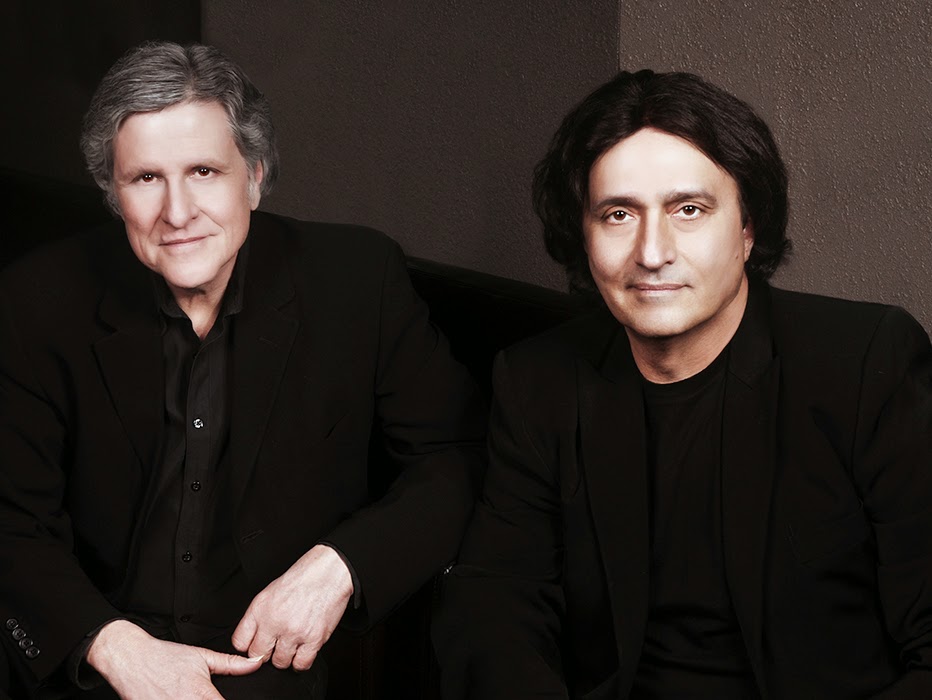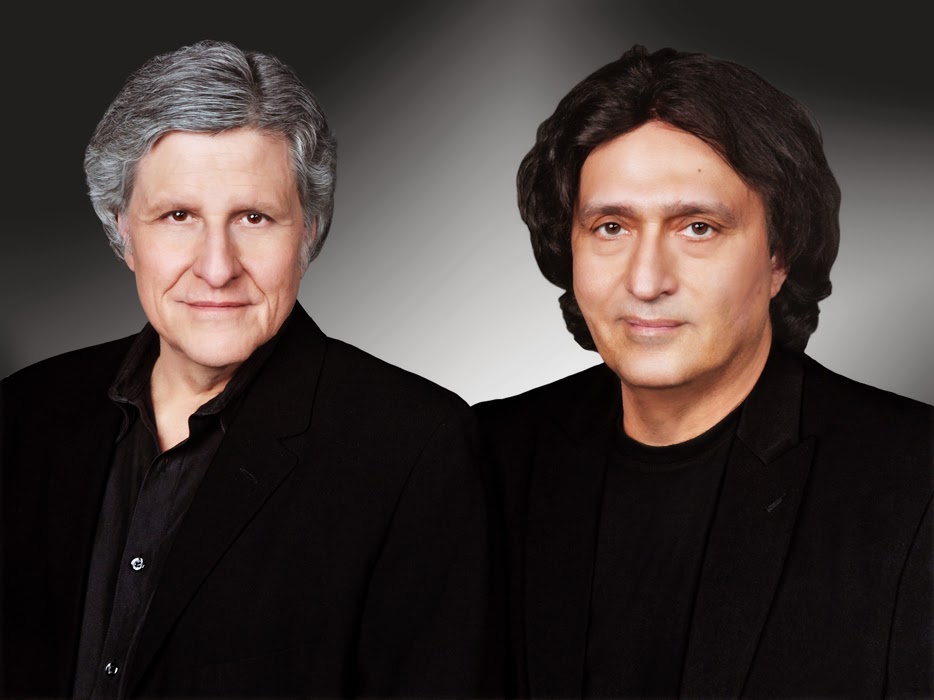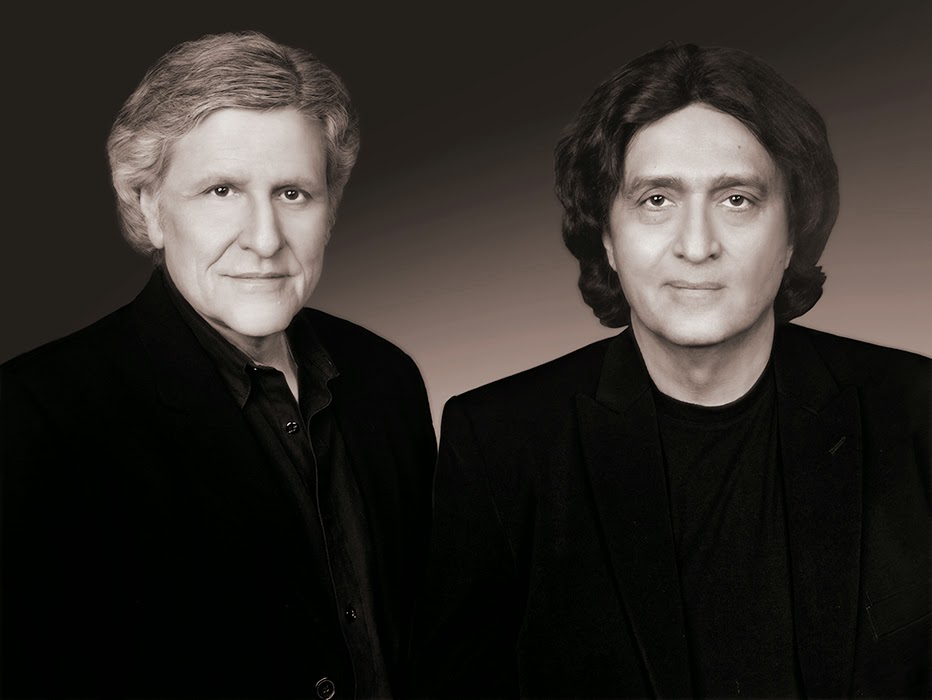All Photos: Alan Mercer
Strunz & Farah’s music is perhaps best described as original multi-cultural acoustic instrumental improvisational guitar music, or world jazz. Their music emphasizes and luxuriates in sensuous melody and rhythm with a colorful and passionate expression, and is saturated with their cultural roots. Afro-Caribbean, Latin American folk, flamenco and Middle Eastern music all converge in an essentially jazz context, especially in the sense of improvisation, and is a unique contribution to the diversity of contemporary guitar music.
Renowned world, jazz, popular, and classical artists they have recorded collectively or individually with include Stanley Clarke, Sting, Hubert Laws, Dr. L. Subramaniam, Hayadeh, Gerardo Nuñez, Manoochehr Sadeghi, Jihad Racy, Edwin Colón Zayas, Liona Boyd, and Ashish Khan. They have also recorded with Joan Baez, and have recorded with and performed often with Jackson Browne.
Strunz & Farah are the innovators of an entirely new expression for the acoustic guitar. Well ahead of their time they created an original style that now is widely influential. They have each brought the musical influences of their native lands into their highly virtuosic, rhythmic, and improvisation-rich original instrumental compositions, inspiring fans and many guitarists worldwide. Their meeting in 1979 in Los Angeles, where they are still based, marked the first time that Latin American and Middle Eastern music, along with other important elements, came together on the guitar. They remain the undisputed masters of the style they created.
Jorge Strunz was born in Costa Rica. Given his first (three-quarter size) guitar at age 6, he grew up also in Colombia, Mexico, Spain, England, Canada, and the United States, studying and playing flamenco and classical guitar. He performed flamenco guitar professionally as a teenager, accompanying Spanish dancers and singers. He later also played electric guitar in numerous rock bands. He then turned to jazz and jazz fusion, and then focused on his own Latin American roots, Caribbean and Latin folk music. Strunz developed an original, lyrical style, and a way of playing guitar that is his own synthesis of hand techniques from flamenco, Latin folk and classical guitar combined with state-of-the art virtuoso linear plectrum playing. In 1994 and in 1998, Strunz received two Presidential awards from the government of Costa Rica for his cultural contributions.
Ardeshir Farah was born in Tehran, Iran. While still a teenager, he moved to England for schooling. He played guitar since childhood, focusing on popular music and improvisation. He has performed and recorded extensively with many of the top expatriate Persian singers and musicians in the US who fled Iran after the Revolution. Farah was the first to use Middle Eastern inflections in a contemporary guitar setting. His distinctive touch has a unique exoticism.
They prepared a repertoire, began performing, and recorded their first project, Mosaico in 1980. Although record companies at that time were not ready for this new music, Los Angeles jazz radio embraced it and world/jazz industry pioneer Richard Bock got the duo signed to the prestigious jazz label Milestone for whom they recorded their revolutionary albums ‘Frontera’ in 1983 and ‘Guitarras’ 1984. These records defined world music on guitar years before the “world music” category existed.
Since 1980, they have made 20 albums, 15 of which are studio recordings, including their very popular titles Primal Magic (1990), which topped the Billboard World Music charts, and the Grammy-nominated Américas (1992), and Heat of the Sun (1994; top 10 Billboard World Music chart). Their latest recording is Moods and Visions (April 2014), celebrating 35 years of highly successful collaboration, continuing and evolving the duo’s original synthesis of multi-cultural elements into a flowing, melodic and rhythmic acoustic guitar style of the highest virtuosity.
In their performances and recordings, which have sold about a million and a half, one can savor the fruits of one of the most unique yet enduring and harmonious musical collaborations in the world of the guitar.
AM: Did either of you envision lifelong music careers when you were children?
Strunz: I did. Definitely, I wanted to be a musician ever since I can remember. I decided I wanted to be a musician by the time I was fourteen.
AM: So you never wanted anything else?
Strunz: I went to school and studied other things, but it was to please family. Both of us did. I went to Georgetown University for five years. Ardeshir graduated with a degree in architecture from USC, but we were always musicians the whole time.
Farah: That part of the story is very similar for the both of us. I also loved playing music from a very early age, but from the part of the world that I’m from, it was about do your studying first and then you can play your guitar. I come from a family that has seven architects and Engineers.
AM: So that’s why you studied architecture. Did you enjoy it?
Farah: In some ways, yes. My family is all into buildings. I used to practice guitar three hours a night when I went to USC. Then I would look at my school books for twenty minutes.
AM: Can you talk about your background?
Strunz: My dad was a foreign services officer so he was a diplomat so we did travel around a lot and lived in a lot of different places. I did get to go to a lot of schools and live in different countries. I had an enriching childhood, certainly rich in different cultures. It can also be a bit confusing but I sorted that out later.
AM: You speak English with no discernible accent.
Strunz: My native language is Spanish but my father spoke English to me and my mother only spoke to me in Spanish so the kids in the family all grew up perfectly bilingual.
Farah: My mother’s two brothers both married Germans. My stepfather is American. My mother’s sister’s husband is also American. From childhood we always spoke English and German. We did a lot of traveling to Europe. Iran is so close that it’s very common for Iranians to drive through Turkey, Greece and France.
AM: I love a worldly upbringing! (laughter from all) Which reminds me that you are considered the leaders in the category of World Music.
Strunz: That may a bit of a stretch, but there were some people involved in doing collaborations with international musicians at the time that Ardeshir and I got together, but it was very few. There were bands like Weather Report who had international groupings. We weren’t the first but we were in the vanguard. We were the first to use third word culture exclusively and melding it with international and American influences.
Farah: World music became a category in 1987. That’s when Billboard magazine coined the name.
AM: Was that a plus for you to have a category?
Stunz: It helped a lot because we would fall through the cracks all the time.
Farah: In this country everything is categorized. You have to be rock or jazz or something.
AM: Do you relate to jazz music?
Strunz: Very much so. I was very much into John Coltrane in the late 60’s while I was living in New York City. Later on I was into Miles Davis. I liked the playing of Pat Martino and spent a lot of time studying him. I definitely have a love for certain types of jazz.
AM: When you were developing your sense of style did you realize it would be so unique?
Farah: We were very unique. We just followed our instincts and drew from our backgrounds and influences. We created the music that came to us naturally. We were not trying to fit into any particular category. I would say we are very unique.
AM: I love how you get the credit for it as well.
Farah: In the beginning it was hard because record companies thought we were too unique.
Strunz: They weren’t sure what our music was.
AM: So then you started your own record label.
Strunz: We did.
AM: Was it natural for you to be business men?
Strunz: No it wasn’t. It was a hat we had to learn how to wear. My wife helped out a lot with that. She is our third team member in a sense. We had to learn how to manufacture records. This is back in 1980.
AM: Did downloading change anything for you?
Strunz: Well, illegal downloading has made a difference for all musicians. We’re an endangered species. There are only 30,000 musicians globally who earn a living from playing music. It’s hurting music a great deal and we are affected.
AM: Is there any style of music that you haven’t recorded yet that you want too?
Strunz: Our style is already a conglomerate of styles and we specialize in it. We don’t want to specialize in other styles of music so much. We love flamenco for example, and sometime people call us flamenco, but we go out of our way to tell them no. We do not play flamenco. It’s an influence but that’s all.
Farah: It’s a completely different style of guitar music. What they do is completely different.
AM: Is there a spiritual aspect to your music?
Strunz: All music has a spiritual component to it. I say spiritual and do not mean religion. Music comes from the spirit. It deals with feelings and emotions that can’t really be put into language.
Farah: It certainly has a spiritual element to it. It also has a strong political statement. We have the coming together of different cultures and brotherhood.
Strunz: These kinds of collaborations tend to be global collaborations.
AM: You have unity of all mankind.
Strunz: We are all in the same boat and we have to deal with global issues together.
Farah: We are fortunate to live in Los Angeles which is a very cosmopolitan city.
To learn more about Strunz & Farah visit their web site http://www.strunzandfarah.com/


